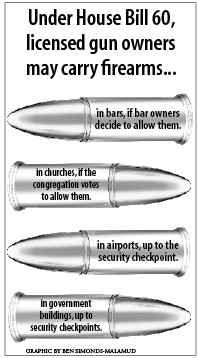 Americans for Responsible Solutions, a gun law advocacy group founded by former U.S. Rep. Gabrielle Giffords, called Georgia House Bill 60 “the guns everywhere bill.” The National Rifle Association called H.B. 60 “the most comprehensive piece of gun legislation in recent state history.” Section 1 of the bill calls itself the “Safe Carry Protection Act.” Brad Vaughan, a policy analyst at the Senate Research Office, said that in the Capitol, H.B. 60 simply goes by “the gun bill.”
Americans for Responsible Solutions, a gun law advocacy group founded by former U.S. Rep. Gabrielle Giffords, called Georgia House Bill 60 “the guns everywhere bill.” The National Rifle Association called H.B. 60 “the most comprehensive piece of gun legislation in recent state history.” Section 1 of the bill calls itself the “Safe Carry Protection Act.” Brad Vaughan, a policy analyst at the Senate Research Office, said that in the Capitol, H.B. 60 simply goes by “the gun bill.”
On April 23, Gov. Nathan Deal signed H.B. 60, a bill which will change many current gun laws in Georgia. In the weeks after Georgia’s legislature passed the bill, the discussion over the bill’s implications amplified. Grady parent Kenneth Heller said the bill was “horrible” and will make Georgia look like the Old West.
“It’s just gonna open Pandora’s box,” Heller said. “Basically, you can carry a gun pretty much anywhere.”
The text of H.B. 60 details the specifics of where Georgians might see an increased presence of firearms. If the bill becomes law, government buildings with security checkpoints—like the state Capitol where lawmakers passed the bill—would still prohibit firearms inside.
Gun owners could carry weapons in other government buildings, as well as in bars and churches where the owner or congregation permits firearms. Travelers who accidentally bring a gun through airport security will face more relaxed penalties.
Gov. Deal, who earned an A-rating from the National Rifle Association and NRA backing in his 2010 campaign, signed the bill in Ellijay. The bill, which the NRA also supported, gained its strongest support in places in Georgia where gun ownership is a more prevalent cultural facet.
Larry Stederson, a Georgia resident who lives in Hephzibah, 14 miles southwest of Augusta, owns a company called Gun Runner Shows, which hosts weekly gun shows across Georgia. He said he supported H.B. 60 because it expands the ability to carry firearms in public.
“As long as it’s pro-gun, I’m all for it,” Stederson said, emphasizing that Hephzibah’s pro-gun nature differs greatly from Atlanta’s. “I know thousands of people, and I don’t know one person that doesn’t own a gun.”
State Sen. Jason Carter (D-Decatur)—also the Democratic candidate for governor in November’s election—was the only Democrat in the Senate who voted for the final version of bill, joined only by three other Democrats in the House.
In a written response to one Georgia voter upset with Carter’s vote, Carter explained that voting “yes” on the bill would allow him to be involved in the conversation.
“I had serious reservations about this bill,” Carter wrote. He fought to do away with “campus carry”—firearms on college campuses—and to make it so bar owners and church congregations must choose to opt into, rather than out of, allowing guns.
He hoped to participate in a conference committee that would involve three members each from the House and Senate, but since the House passed the Senate’s amended version of H.B. 60 on March 20, the gun bill never reached a conference committee.
Heller said it is likely that Carter may have just been “playing politics” in an effort to win over more Republican voters in the gubernatorial race.
“Conservatives, in my opinion, generally they’re very tribalistic,” Heller said. “They believe that anyone who’s different from them is a threat.”
Stederson said the United States’ political makeup is moving in the wrong direction.
“I think we need to get rid of the liberal Democrats and put more conservative Republicans in political offices,” Stederson said.
With a gun bill whose consequences have not yet been observed, the debate over guns in Georgia is far from over.







